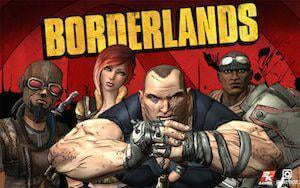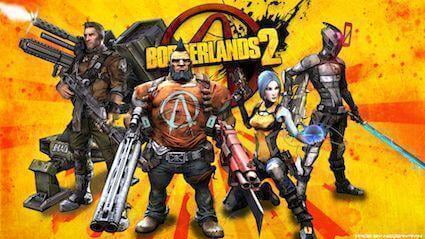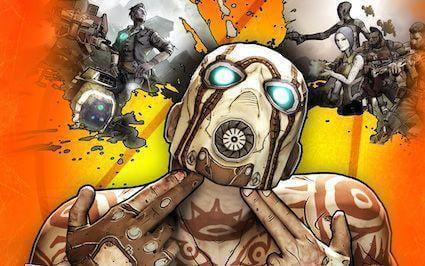Why do you play Borderlands? Is it the Story or The Action?
 Spoiler note: This post contains plot spoilers about Borderlands and Borderlands 2 and, by default, spoilers about the characters in the upcoming Pre-Sequel who also appear in Borderlands 2. Spoiling Borderlands 1 for you might actually be doing you a favor, though. That ending’s terrible.
Spoiler note: This post contains plot spoilers about Borderlands and Borderlands 2 and, by default, spoilers about the characters in the upcoming Pre-Sequel who also appear in Borderlands 2. Spoiling Borderlands 1 for you might actually be doing you a favor, though. That ending’s terrible.
With Borderlands: The Pre-Sequel right around the corner, I recently explained why the first two games are so hard to put down. You might notice that that post doesn’t talk about story at all. You don’t play Borderlands for the story. But—and this is coming from a gamer deeply interested in video game storytelling—that’s okay. Some games are fun enough that they can do just fine with no narrative interest whatsoever. Borderlands is one of those series.
That being said, the ending of the first Borderlands was one of the bigger narrative train wrecks in recent gaming memory.
But to their credit, Gearbox admitted it, learned from it, and made the story and characters of Borderlands 2 (many of whom we will see again in The Pre-Sequel) much more satisfying. They’re still not the things attracting me to the series, but now they make it better rather than worse.
Borderlands 1. Where to begin? Up to the end, the story was neutral, and the characters were quirky enough to be fun, except of course for the silent player-characters who had no discernible  personalities. And then the ending. The WHOLE GAME is building up to opening the vault, PROMISING something amazing, and when you get there, it’s a monster and a bit of loot and the suggestion that the Guardian Angel in your head is a corporate A.I.
personalities. And then the ending. The WHOLE GAME is building up to opening the vault, PROMISING something amazing, and when you get there, it’s a monster and a bit of loot and the suggestion that the Guardian Angel in your head is a corporate A.I.
Borderlands, why would you do this?
If you didn’t have an interesting reveal, why devote the ENTIRE STORY to promising and building up to one? Apparently because (as the article linked above suggests) the developers couldn’t decide where to take the story. Which is understandable, considering that the story was obviously not priority number one. Still, despite the colorful world and characters, when I think “Borderlands 1” and “story,” I think of the ridiculous letdown of an ending and get annoyed.
Borderlands 2 did better
Gearbox had learned that a huge buildup with no payoff is a bad idea. The ending was still relatively anti-climactic, but not nearly as much so. This was both because Gearbox didn’t do so much building up of the finale, and because they made it slightly more satisfying through the showdown with Handsome Jack. Whereas at the end of Borderlands 1, you see a new monster kill a mediocre villain, and then you kill the monster, without having much reason to care about any of it, Borderlands 2 makes it easy and fun to root against Jack.
So getting to kill him in the end, while not particularly challenging as combat, is somewhat satisfying as story. The fight with the Warrior is basically the same “okay, whatever” scenario as the end boss fight of Borderlands 1, though. No real reason to care about the monster, not particularly challenging tactically...overall, it’s an anticlimax. But because it’s not built up so much, I didn’t really care.
Where Borderlands 2 really improves
Is on the storytelling of the first game in through the middle of the game. First, Borderlands 2 doubled down on their gameplay by making most of the storytelling happen in voice-overs while you fight. That makes it a bit harder to figure out what’s going on if your attention is demanded by the combat, but it means that the storytelling doesn’t slow down the gameplay and emphasizes that the story isn’t really trying to compete with gameplay for prominence.
The story happens while you fight, rather than the game making you stop the fight to pay attention to a story that would probably just disappoint you if you got your hopes up too much.
In addition to being less obtrusive than in the first game
The story of Borderlands 2 is also more interesting. The decision to give the four vault hunters from the first game personalities as NPCs works fine. They’re not fascinating, but their fates gain a bit of emotional impact without Gearbox having to spend much time in-game developing them first because we already care (at least a little) because we spent tens of hours playing on them last time around.
The new secondary characters like Tiny Tina, Sir Hammerlock, and Ellie aren’t particularly interesting, in my opinion. Tiny Tina’s unbalanced young orphan is kind of interesting, though a white child inexplicably using a black dialect to make mature references is less funny than distracting to me (even if I wouldn’t necessarily go so far as to say Tina is actively racist, as some have), especially in a game whose only major black character is the only major character they kill off, fitting the “The Black Dude Dies First” story trope. Returning secondary characters like Marcus, Dr. Zed, and of course Claptrap, however, remain fun.
dialect to make mature references is less funny than distracting to me (even if I wouldn’t necessarily go so far as to say Tina is actively racist, as some have), especially in a game whose only major black character is the only major character they kill off, fitting the “The Black Dude Dies First” story trope. Returning secondary characters like Marcus, Dr. Zed, and of course Claptrap, however, remain fun.
I particularly liked Dr. Zed’sdialogue during the “Monster Mash” side quests, the weird storyline in which you realize that a bandit group has started worshipping Marcus, and most of Claptrap’s stuff, from his birthday party and secret stash to his door-and-stair skills at the end.
Regardless of the ups and downs of the characters
The story itself is more fun because Handsome Jack is so fun to hate, and the side missions add some helpful variety. Some of my favorite side missions were the ones that involved Jack, like his requests that you kill yourself (I did) and that you check on his grandmother for him. The main story about Jack (and Angel) generally held my interest, in part because it didn’t ask for my attention too often.
The Conclusion
So overall, the storytelling in Borderlands 2 was a step up from the first game, partly because it was less disastrously structured and partly because quite a bit of it was fun. Pandora is a colorful world, and interacting with its zany characters while you do your fightin’ makes it more entertaining.
I will admit, I don't have high hopes that the story being told in The Pre-Sequel will be anything to write home about. But that’s okay, both because story isn’t the main reason I play, and because I suspect that if I go in without huge expectations, I’ll probably be content or even pleasantly surprised. I have similar mixed feelings about Telltale’s upcoming Tales from the Borderlands because (as I mention in another series of posts), I’m a big fan of their storytelling when it works, but I’ve been burned by the times it hasn’t worked.
I’m cautiously optimistic that at the very least, Telltale’s take will provide interesting story ideas that Gearbox might be able to build on down the line, and I suspect Borderlands might be a good IP for Telltale to work with because there’s enough space for creativity within the loose narrative frame Gearbox has developed that they can probably tell an interesting story without hitting major outside limitations based on Gearbox’s vision for the IP.
So what do you think? Am I off on my analysis of the storytelling in the first two games?
What did you like best and hate most about their narratives? Which upcoming Borderlands game are you more excited about, and why?

Comments